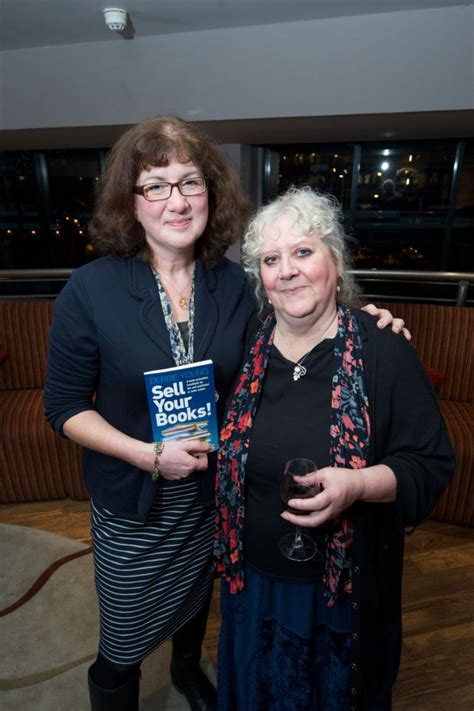A Quote by Holly Black
There is nothing for her beyond those gates," Gavriel said. "Do you think to bring her along like a talisman to remind you of your humanity? Or do you think sharing your damnation will lighten the burden of it?
Related Quotes
One day, lad, your eyes will light upon a woman, and you will never forget that glint in her eye, that toss of her head, or sway of her hips. You will dream of her, whether you are asleep of awake. She will possess your mind, and your body will be on fire for her. Nothing will ever erase the linger of her scent in your nostrils, the touch of her hand on your body, the feel of her flesh beneath your fingers. When you find a woman to love, Cnut, your life changes forever.
So use all that is called fortune. Most men gamble with her, and gain all and lose all, as her wheel rolls... A political victory, a rise of rents, the recovery of your sick or the return of your absent friend, or some other favorable event raises your spirits, and you think good days are preparing for you. Do not believe it. Nothing can bring you peace but yourself. Nothing can bring you peace but the triumph of principles.
Those who think that a woman detained at home by her little family is doing nothing, think the reverse of what is true. Scarcely can the godly mother quit her home for a place of worship; but dream not that she is lost to the work of the church; far from it, she is doing the best possible service for her Lord. Mothers, the godly training of your offspring is your first and most pressing duty.
Love your material. Nothing frightens the inner critic more than the writer who loves her work. The writer who is enamored of her material forgets all about censoring herself. She doesn't stop to wonder if her book is any good, or who will publish it, or what people will think. She writes in a trance, losing track of time, hearing only her characters in her head.
Nicias, do you think you can erase with good deeds the wrongs you committed against your mother? What good deed will ever reach her? Her soul is a scorching noon time, without a single breath of a breeze, nothing moves, nothing changes, nothing lives there; a great emaciated sun, an immobile sun eternally consumes her.
We are divided between those who think with their heads and those who know with their heart. Consider Harriet Miers. If you think about Harriet Miers, of course her nomination is absurd. But the President didn't say he thought about his selection. He said this: "I know her heart." Notice how he said nothing about her brain? He didn't have to. He feels the truth about Harriet Miers.
Your face will freeze like that, you know, Kat," Raffin said helpfully to Katsa. "Maybe I should rearrange your face, Raff," said Katsa. "I should like smaller ears," Raffin offered. "Prince Raffin has nice, handsome ears," Helda said, not looking up from her knitting. "As will his children. Your children will have no ears at all, My Lady," she said sternly to Katsa. Katsa stared back at her, flabbergasted. "I believe it's more that her ears won't have children," began Raffin, "which, you'll agree, sounds much less—
Liberty is a harsh mistress. You cannot pick and choose what you like and dislike about her. Liberty will not change her principles for you, no matter how much you claim to love her. She will stand fast in her demands for total acceptance. If you can't receive her, she will recognize you as a false lover and leave you. And when you hear that door slam, it will take every tear in your eye, every ounce of blood in your veins, and all the nerve in your heart to win her back.
The moment the door closed behind him, Tessa was in Will's arms, her hands locked about his neck. "Oh, by the Angel," she said. "That was mortifying." Will slid his hands into her hair and was kissing her, kissing her eyelids and her cheeks and then her mouth, quickly but with fervor and concentration, as if nothing could be more important. "Listen to you," he said. "You said 'by the angel.' Like a Shadowhunter." He kissed the side of her mouth. "I love you. God, I love you. I waited so long to say it.
So your strength is failing you? Why don't you tell your mother about it? ... Mother! Call her with a loud voice. She is listening to you; she sees you in danger, perhaps, and she-your holy mother Mary-offers you, along with the grace of her son, the refuge of her arms, the tenderness of her embrace ... and you will find yourself with added strength for the new battle.
Jem seemed to look through her then, as if he were seeing something beyond her, beyond the corridor, beyond the Institute itself. "Whatever you are physically," he said, "male or female, strong or weak, ill or healthy--all those things matter less than what your heart contains. If you have the soul of a warrior, you are a warrior. All those other things, they are the glass that contains the lamp, but you are the light inside." He smiled them, seeming to have come back to himself, slightly embarrassed. "That's what I believe.
Once, during an interview in front of my wife, I was asked, "Are you one of those actors who brings your character home? Do you stay in character?" I said, "No, not really. I don't do that," and she started laughing. I asked her why. She said, "Well, you might think you don't bring characters home, but you do." So, while I don't feel like a character is lingering, it probably is.
The world taught women nothing skillful and then said her work was valueless. It permitted her no opinions and said she did not know how to think. It forbade her to speak in public and said the sex had no orators. It denied her the schools, and said the sex had no genius. It robbed her of every vestige of responsibility, and then called her weak. It taught her that every pleasure must come as a favor from men and when, to gain it, she decked herself in paint and fine feathers, as she had been taught to do, it called her vain.





































